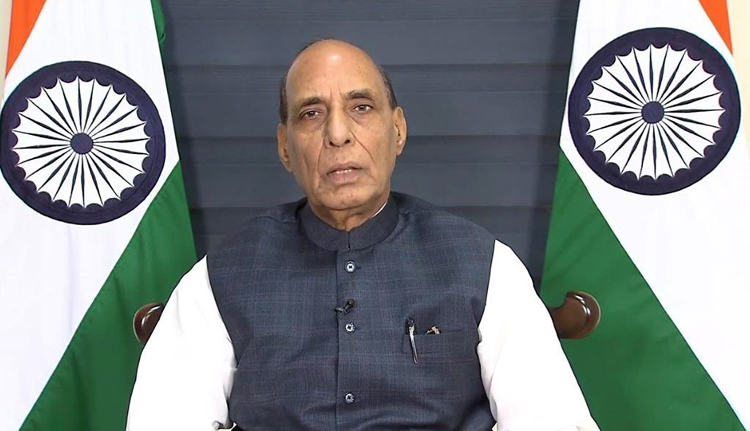INDIAN ARMED FORCES CHIEFS ON OUR RELENTLESS AND FOCUSED PUBLISHING EFFORTS

The insightful articles, inspiring narrations and analytical perspectives presented by the Editorial Team, establish an alluring connect with the reader. My compliments and best wishes to SP Guide Publications.

"Over the past 60 years, the growth of SP Guide Publications has mirrored the rising stature of Indian Navy. Its well-researched and informative magazines on Defence and Aerospace sector have served to shape an educated opinion of our military personnel, policy makers and the public alike. I wish SP's Publication team continued success, fair winds and following seas in all future endeavour!"

Since, its inception in 1964, SP Guide Publications has consistently demonstrated commitment to high-quality journalism in the aerospace and defence sectors, earning a well-deserved reputation as Asia's largest media house in this domain. I wish SP Guide Publications continued success in its pursuit of excellence.
- MoD initiates comprehensive review of Defence Acquisition Procedure 2020, pushes for defence reforms
- G7: The Swansong
- Kalinga Connect: South Asia to Polynesia
- Advanced MRSAM for India for a greater firepower
- Must Credit DRDO for Operation Sindoor, now what is next for defence R&D?
- Operation Sindoor | Day 2 DGMOs Briefing
- Operation Sindoor: Resolute yet Restrained
India determined to protect its maritime interests in the Indo-Pacific: Rajnath Singh
Under the shadow of Chinese belligerence, Defence Minister seeks convergence of interests to face challenges

India is fully determined to protect its maritime interests and seeks a convergence of interests to protect a rules-based maritime order to both secure the seas and to exploit its economic potential, Defence Minister Rajnath Singh declared at a premier conference of the Indian Navy in October 27.
“India is committed to respecting the rights of all nations as laid down in the UN Convention on the Law of Seas (UNCLOS), 1982. We are fully determined to protect the legitimate rights and interests of our country in relation to our territorial waters and Exclusive Economic Zone, while supporting the maintenance of rule-based maritime systems, as mandated under UNCLOS, 1982,” Defence Minister Singh said in his keynote address at the Indo-Pacific Regional Dialogue 2021 (IPRD 2021).
He made these remarks in the backdrop of increasing maritime belligerence by China and its relentless strategic challenge to India in the waters which have traditionally been India’s maritime backyard and area of influence, and the Indo-Pacific becoming the centre of gravity of the global strategic contest.
Addressing the Inaugural session of Indo-Pacific Regional Dialogue 2021. Watch https://t.co/8Q2bK1NfGZ
— Rajnath Singh (@rajnathsingh) October 27, 2021
Singh called for a cooperative response to suchmaritime challenges as terrorism, drug trafficking, piracy and climate change,which, he said, had considerable trans-national implications. “There is a need to find convergence of interests and commonality of purpose on maritime issues,” he urged.
The theme of IPRD 2021 is, ‘Evolution in Maritime Strategy during the 21st Century: Imperatives, Challenges and Way Ahead’.
India’s Defence Minister also pushed for a collaborative approach to harnessing the economic potential of the Indo-Pacific. “Although the Indo-Pacific is characterised by diversity, marked by a multiplicity of cultures, ethnicities, economic models, governance systems and varied aspirations, the oceans remain a common binding link,” he said. Singh emphasised the need for an efficient, cooperative and collaborative harnessing of the region’s maritime potential for sustaining a steady path to prosperity.
“India is committed to respecting the rights of all nations as laid down in the UN Convention on the Law of Seas (UNCLOS), 1982. We are fully determined to protect the legitimate rights and interests of our country in relation to our territorial waters and Exclusive Economic Zone, while supporting the maintenance of rule-based maritime systems, as mandated under UNCLOS, 1982,” Defence Minister Singh said in his keynote address at the India-Pacific Regional Dialogue 2021 (IPRD 2021)
Invoking Prime Minister Narendra Modi’s description of the Indo-Pacific as a natural region where destinies of entities are interlinked, the Defence Ministersaid the seas are a vital communication link to facilitate transport of goods, exchange of ideas, catalysing innovations and contributing to bringing the world closer.
“Looking East, maritime linkages also played a vital role in taking Buddhism across the region, from Sri Lanka, South- East Asian countries and all the way till Korea,” Singh said, making a reference to India’s historical footprint and traditional goodwill for it in the region.
The IPRD is a military diplomacy outreach by the Indian Navy. It’s a high-level annual conference which was first held in 2018. It is conducted through the National Maritime Foundation, a think tank of the Indian Navy.
IPRD 2021 will focus on eight specific sub-themes in its online deliberations from October 27 to 29:
- Evolving Maritime Strategies within the Indo-Pacific: Convergences, Divergences, Expectations and Apprehensions.
- Adaptive Strategies to Address the Impact of Climate Change upon Maritime Security.
- Port-led Regional Maritime Connectivity and Development Strategies.
- Cooperative Maritime Domain Awareness Strategies.
- Impact of the Increasing Recourse to Lawfare upon a Rules-based Indo-Pacific Maritime Order.
- Strategies to Promote Regional Public-Private Maritime Partnerships.
- Energy-Insecurity and Mitigating Strategies.
- Strategies to Address the Manned-Unmanned Conundrum at Sea.
Panel-discussions on these sub-themes would be spread over eight sessions.
Chief of the Naval Staff Admiral Karambir Singh, former Chief of the Naval Staff and Chairman National Maritime Foundation Admiral Sunil Lanba (Retd), domain experts and policy makers of different countries were present virtually during the inaugural session chaired by the Defence Minister.





